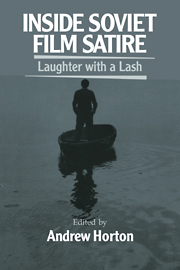Book contents
- Frontmatter
- Contents
- Foreword: If life itself is a satire …
- Acknowledgments
- Editor's note
- Introduction: Carnival versus lashing laughter in Soviet cinema
- Part One The long view: Soviet satire in context
- Part Two Middle-distance shots: The individual satire considered
- Part Three Close-ups: Glasnost and Soviet satire
- Filmography
- Contributors
- Index
Foreword: If life itself is a satire …
Published online by Cambridge University Press: 07 October 2009
- Frontmatter
- Contents
- Foreword: If life itself is a satire …
- Acknowledgments
- Editor's note
- Introduction: Carnival versus lashing laughter in Soviet cinema
- Part One The long view: Soviet satire in context
- Part Two Middle-distance shots: The individual satire considered
- Part Three Close-ups: Glasnost and Soviet satire
- Filmography
- Contributors
- Index
Summary
It's quite a thrill to open a book about Soviet film satire when the Soviet Union has disappeared, for satire has now become a fundamental characteristic of everyday life in the ex-USSR. It seems that the satiric verve along with Russia's cultural tradition is, unlike the Union, still alive. This fact makes the present retrospective even more interesting, in a way like a postmortem.
Andrew Horton has succeeded where everybody else failed: In New Orleans (Loyola University), he gathered a group of Russian and American scholars with very different backgrounds, both academic and practical, and made them speak the unspeakable: about satire in a totalitarian state. And each speaker discovered and proved from his or her own perspective not only that satiric films did exist, but that they constituted the most subversive genre in the vast domain reigned over by Socialist Realism.
In a way, the posttotalitarian seriousness we have experienced since the beginning of perestroika and glasnost, down to the farcical conclusion with the August Coup (1991), proves to be a backlash from the previous Aesopian power and satiric perspective cherished by many Russian, Ukrainian, Georgian, and other filmmakers in the former Soviet Union.
This book is as much testimony as it is an investigation into the unknown or, better, never-acknowledged territory of Soviet film satire.
- Type
- Chapter
- Information
- Inside Soviet Film Satire , pp. vii - viiiPublisher: Cambridge University PressPrint publication year: 1993

